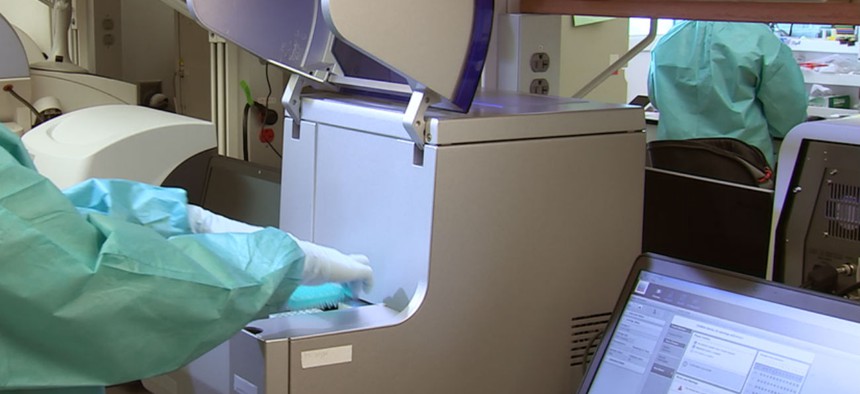
A scientist with the Centers for Disease Control and Prevention performs genome sequencing to compare the genetic sequences of vaccine viruses with those of circulating viruses. Emily Cramer / CDC
House Panel Advances Bipartisan Bill to Protect Federal Scientists From Undue Political Influence
Career employees working in science would enjoy an array of new rights under the bill.
A House committee on Thursday approved with bipartisan support a measure to protect federal scientists and the data they collect from political influence, with proponents saying it would insulate public servants from undue pressures that could compromise their work.
The Scientific Integrity Act (H.R. 1709) would prevent agency officials from interfering with scientific research, including through putting their thumbs on the scale of findings or blocking the distribution of data or public communications. The measure would give scientists the right to review information their agencies distribute about their work to correct any technical inaccuracies. Federal scientists would be free to talk to the media if contacted, and agencies would be required to offer scientists the option to respond directly to press inquiries about their work.
The House Science, Space and Technology Committee easily approved the bill by a 25-6 vote, sending it to the House floor. Sen. Brian Schatz, D-Hawaii, has introduced companion legislation in the Senate.
The measure would prohibit agencies from allowing “political considerations” to impact scientific conclusions, impeding the “timely release” of scientific or technical findings, and coercing or intimidating employees to alter those findings. It would ensure agencies only select and retain candidates for scientific positions based on expertise, experience and credentials. Agencies would have to establish “enforcement processes” that provide federal scientists with the opportunity for a hearing and an appeal when they feel their rights under the bill have been violated.
“At its heart, science doesn’t serve political power, it just tries to tell us the truth,” said Rep. Paul Tonko, D-N.Y., who introduced the bill. “In contrast, when we allow political power to interfere with our public science, the result is lost rights and freedoms, lost wages to medical bills, burned or flooded homes, lost years from our lives and the irreplaceable loss of loved ones. These are the consequences that scientific integrity policies exist to prevent.”
More than 20 agencies currently have scientific integrity policies, which would have to come in compliance with the legislation if it were signed into law. President Obama previously signed an executive order requiring all agencies to develop their own integrity policies, but many have failed to do so.
All agencies involved in scientific work would develop policies bringing them in compliance with the bill and submit them to Congress and the Office of Science and Technology Policy. They would also appoint a “scientific integrity officer,” a career scientist who would be responsible for overseeing those policies, creating training programs to inform employees of their new rights and reporting all violations to Congress annually.
A recent study from the Brennan Center supporting a law like the Science Integrity Act cited more than 40 incidents of the Trump administration improperly meddling in scientific work, manipulating research or restricting access to federal data.
Examples included prohibiting scientists from attending conferences, instructions to avoid phrases such as “climate change” and alterations to federal environmental impact studies. Employees at agencies like NASA, the Environmental Protection Agency, and the National Oceanic and Atmospheric Administration have told Government Executive they are facing unprecedented interference from political leadership, including rollbacks of previous work and interfering in research. Scientists reported being left out key meetings, feeling fearful in their offices and a general sense of low morale. A Union of Concerned Scientists survey last year found federal employees felt stymied by censorship and interference from political appointees, including 50% who said political considerations were hindering agencies' ability to make science-based decisions.
“President Trump’s multi-agency assault on environmental standards has hinged on efforts to distort, bury and even rewrite credible public scientific findings,” Tonko said when introducing his bill earlier this year.
Inquiries to the Environmental Protection Agency scientific integrity office have spiked during the Trump administration, that office said in June. Speaking in the foreign policy realm, acting White House Chief of Staff Mick Mulvaney said on Thursday career employees who feel undue political influence on their work should "get over it."







